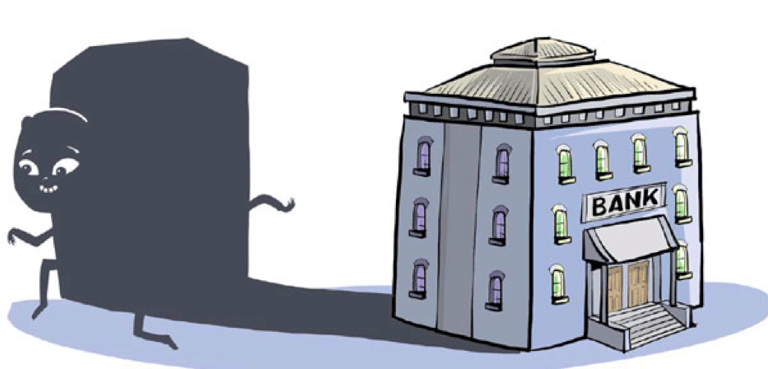The Shadow Banking Industry: Unveiling Hidden Risks and How to Demand Change


In the world of finance, there exists a vast, intricate web of institutions, systems, and practices, and at the periphery of this web lies the shadow banking industry. This largely unregulated sector has grown to be a substantial part of the global financial system, and its actions have far-reaching implications for economies and consumers worldwide. I want to dive deep into the shadow banking industry, examining what it is, how it came into existence, and why it poses a significant threat, particularly in the context of the Federal Reserve's battle against inflation. We will also explore the negative effects on consumers and discuss actionable steps for the average person to demand greater transparency and accountability from their government regarding the shadow banking industry.
Defining the Shadow Banking Industry
To begin, let's define the enigmatic entity we refer to as the shadow banking industry. It represents a parallel financial system operating alongside traditional banks but without the same level of oversight and regulatory constraints. This uncharted territory is inhabited by a multitude of non-bank financial entities such as money market funds, investment banks, hedge funds, and special purpose entities. These entities perform banking-like activities, such as lending, securitization, and trading, without the strict rules and protections that traditional banks are subject to.
Uncovering the Genesis of Shadow Banking
Understanding the origins of the shadow banking industry is critical to comprehending its significance. It came into existence as a response to the regulatory constraints placed on traditional banks. While these regulations were introduced to protect the stability of the financial system (ie the average person), they also limited the flexibility and profitability of these institutions - which is not to say that this is a bad thing! This created a demand for alternative sources of financing and investment opportunities, and thus, the shadow banking industry was born.
The Challenge to Inflation Control
Now, let's address a crucial issue – how the shadow banking industry undermines the Federal Reserve's ability to curb inflation. The critical factor at play here is the lack of regulatory oversight. Shadow banks operate without the stringent reserve requirements and safeguards that traditional banks adhere to. Consequently, they can create credit and liquidity in the economy at a much faster rate. The injection of such additional funds can lead to inflationary pressures, a phenomenon that the Federal Reserve struggles to control.
It's essential to understand that inflation is a delicate balance. While moderate inflation is often seen as a sign of a healthy, growing economy, excessive inflation can erode purchasing power, leading to economic instability. The Federal Reserve uses interest rate adjustments as a tool to manage inflation, but the influence of shadow banking can make this task increasingly challenging. This is also why we are still facing high inflation, ever growing cost of living increases, and the reduction in purchasing power. Unfortunately, we are not even at the point where inflation is reducing yet, merely slowing down the rate of growth. Unfortunately, this pain will be felt for many years to come still.
Negative Impact on Consumers
The shadow banking industry might seem distant and abstract, but its actions have direct consequences for consumers. When the financial system becomes unstable due to risky shadow banking activities, it can trigger economic crises. The fallout from such crises includes job losses, reduced access to credit, and housing market collapses. The 2008 financial crisis serves as a stark reminder of the potential repercussions.
Demanding Accountability and Transparency
As someone who is directly affect by the actions of the financial industry, here's how you can make a difference:
Educate Yourself: Deepen your knowledge about the shadow banking industry. There are numerous books, articles, and reports available that shed light on the intricacies of this sector.
Support Regulation: Advocate for stricter regulation of non-bank financial institutions. Engage with your local representatives and urge them to support legislation aimed at addressing the risks associated with the shadow banking industry.
Join Watchdog Organizations: Various organizations focus on financial transparency and accountability. Consider supporting these groups or becoming actively involved in their activities.
Exercise Your Voting Power: In a democracy, your vote is your voice. Choose candidates who prioritize financial sector reform and transparency, not candidates who support further deregulation. Make informed decisions at the ballot box.
Stay Informed: Keep a watchful eye on financial news and developments. Staying informed about changes and challenges in the financial sector will enable you to participate in informed discussions and advocacy.
The shadow banking industry, with its potential to undermine financial stability and economic well-being, is an issue that should concern us all. By educating ourselves and demanding greater accountability and transparency, we can help bring this shadowy world into the light, making the financial system safer and more equitable for everyone. It's a journey worth embarking upon for the sake of our financial security and economic stability. The shadow may be long, but with determination and collective action, it can be illuminated. Never stop fighting for what is right!
Here are some sources that I highly encourage you to make use of:
To easily contact your local Representatives:
Get connected with advocacy groups:
Interested in learning how to take advantage of the volatility and risks imposed by the shadow banking system? Schedule a free consultation with us today!




